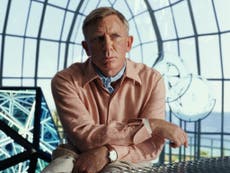Paul Schrader questions Babylon’s historical authenticity: ‘I was scratching my head’
‘Does any film historian agree with the film’s putative historicity?’ famed ‘American Gigolo’ director asked
Your support helps us to tell the story
From reproductive rights to climate change to Big Tech, The Independent is on the ground when the story is developing. Whether it's investigating the financials of Elon Musk's pro-Trump PAC or producing our latest documentary, 'The A Word', which shines a light on the American women fighting for reproductive rights, we know how important it is to parse out the facts from the messaging.
At such a critical moment in US history, we need reporters on the ground. Your donation allows us to keep sending journalists to speak to both sides of the story.
The Independent is trusted by Americans across the entire political spectrum. And unlike many other quality news outlets, we choose not to lock Americans out of our reporting and analysis with paywalls. We believe quality journalism should be available to everyone, paid for by those who can afford it.
Your support makes all the difference.Paul Schrader has shared critical input regarding the “putative historicity” of Damien Chazelle’s Babylon.
Oscar-winning director Chazelle’s newest romance-drama, starring Margot Robbie and Brad Pitt, chronicles the rise and fall of several ambitious Hollywood dreamers during the transition from silent to sound films in the late 1920s.
Since its release in US cinemas on 23 December, the film has been a box office flop, with some headlines and social media users seemingly blaming Robbie for its poor performance. However, others have come to the star’s defence.
The movie had also received mixed reviews and currently sits at a mediocre Rotten Tomatoes critic score of 55 per cent.
Now, renowned American Gigolo director Schrader has added to the divisive discourse surrounding the movie, questioning how “well-researched” it is.
“Babylon is many things but well-researched isn’t one of them,” Schrader recently wrote on Facebook.
“After reading a number of planted articles about the filmmakers’ voluminous ‘research’, I was scratching my head,” he added, asking: “Does any film historian agree with the film’s putative historicity?”

Although the movie’s fictional cast of characters reference many films and actors of the silent era, Babylon’s presentation of 1920s Hollywood takes on historical liberties.
For example, the starlets and directors are shown doing heavy amounts of cocaine. When in reality – while cocaine was certainly around back then – the drug of choice was typically morphine and opium, according to IndieWire.

Watch Apple TV+ free for 7 days
New subscribers only. £8.99/mo. after free trial. Plan auto-renews until cancelled

Watch Apple TV+ free for 7 days
New subscribers only. £8.99/mo. after free trial. Plan auto-renews until cancelled
In an earlier interview, Chazelle explained that he began his research by viewing documentaries and silent film epics, as well as visiting library archives.
“It was a little treasure trove I kept dipping into over many years,” Chazelle said. “The research was so addictive that it took a conscious decision to finally go, ‘It’s now or never. This should be the movie I should try to make now.’
“So I have to close the book, look at these notes I’ve collected over the years, this dense mass of impenetrable stuff, and actually figure out what the roadmap through that would be.”
Read The Independent’s five-star review of the film here.
Babylon is out in US cinemas now and will arrive in UK cinemas on 20 January.




Join our commenting forum
Join thought-provoking conversations, follow other Independent readers and see their replies
Comments